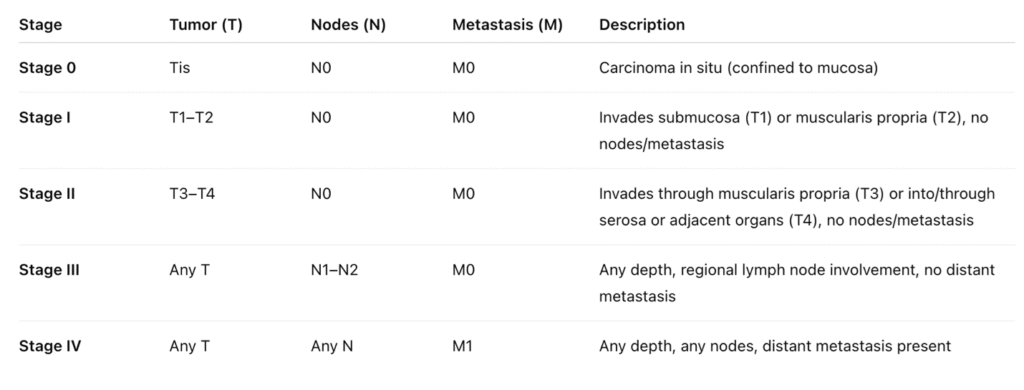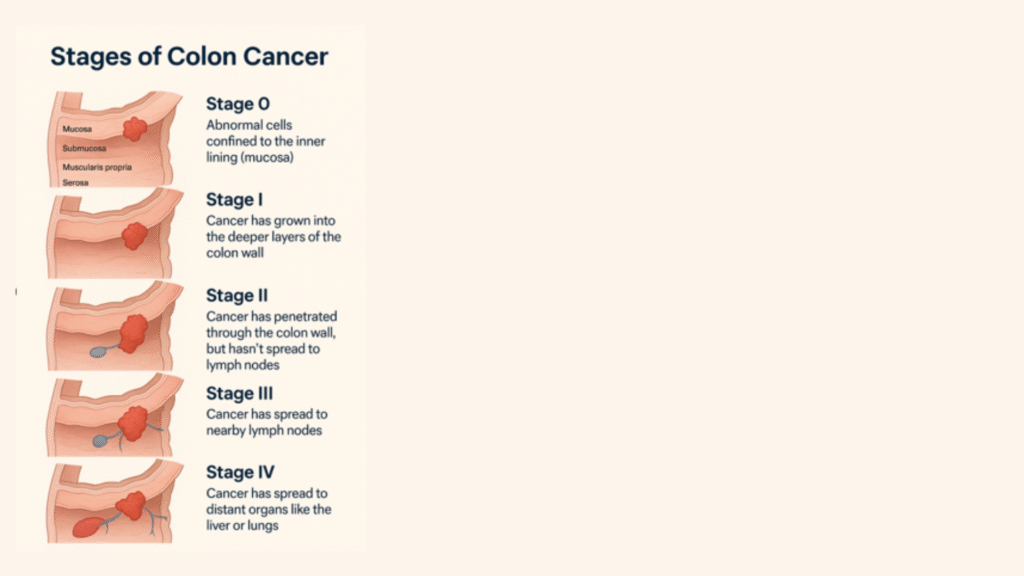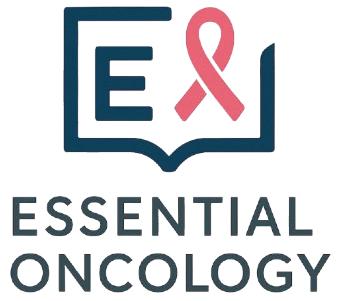Colon Cancer
Designed for students and trainees, this section summarizes key clinical trials in colon cancer across adjuvant, metastatic, and immunotherapy settings. Learn the evidence behind today’s treatment strategies with clear, concise takeaways.



Adjuvant chemotherapy in stage II/III colon cancer
Trial | Key contribution |
MOSAIC (2004) | Established FOLFOX (oxaliplatin + 5-FU/leucovorin) as standard adjuvant therapy; improved disease-free survival vs 5-FU/LV alone. |
QUASAR (2007) | Showed adjuvant chemotherapy improves survival even in selected stage II patients; benefit is modest. |
IDEA collaboration (2018) | Pooled analysis comparing 3 vs 6 months of adjuvant FOLFOX/CAPOX; found non-inferiority in low-risk stage III with 3 months, but not high-risk. |
Targeted therapies in metastatic colon cancer
Trial | Key contribution |
CRYSTAL (2009) | Addition of cetuximab to FOLFIRI improved response and PFS in RAS wild-type mCRC. |
CALGB/SWOG 80405 (2014) | Head-to-head: cetuximab vs bevacizumab with chemotherapy; similar OS; choice depends on toxicity and other factors. |
NO16966 (2007) | Showed adding bevacizumab to XELOX/FOLFOX improved PFS in first-line mCRC. |
Immunotherapy in MSI-high mCRC
Trial | Key contribution |
KEYNOTE-177 (2020) | Pembrolizumab vs chemotherapy in untreated MSI-H mCRC; superior PFS and response rate with pembrolizumab. |
CheckMate-142 (2017 & 2018) | Nivolumab (alone or with ipilimumab) showed durable responses in previously treated MSI-H mCRC. |
Other important trials
Trial | Key contribution |
Tournigand (2004) | Showed that sequence of FOLFOX and FOLFIRI matters less than both being used at some point. |
🧪 MOSAIC Trial
Trial Name / Acronym
MOSAIC
Publication Details
Title: Oxaliplatin, Fluorouracil, and Leucovorin as Adjuvant Treatment for Colon Cancer
Journal: New England Journal of Medicine (NEJM)
Year: 2004
DOI: 10.1056/NEJMoa032709
Patient Population
Patients with stage II or III colon cancer after curative resection.
Intervention / Control
Experimental arm: FOLFOX4 (oxaliplatin + leucovorin + 5-FU)
Control arm: LV5FU2 (leucovorin + 5-FU)
Key Findings / Outcomes
- In stage III patients, 6-year disease-free survival: 58.9% with FOLFOX4 vs 49.6% with LV5FU2.
- Overall survival: 72.9% vs 68.7%.
- The benefit was mainly in stage III disease; limited effect in stage II.
Impact / Significance
Established FOLFOX as standard adjuvant chemotherapy for stage III colon cancer.
🧪 QUASAR Trial
Trial Name / Acronym
QUASAR
Publication Details
Title: Adjuvant chemotherapy versus observation in patients with colorectal cancer: a randomised study
Journal: The Lancet
Year: 2007
DOI: 10.1016/S0140-6736(07)60462-2
Patient Population
Primarily stage II colon cancer patients after resection.
Intervention / Control
Experimental arm: 5-FU/LV adjuvant chemotherapy
Control arm: Observation
Key Findings / Outcomes
- Reduced risk of death by ~18%.
- Absolute survival benefit about 3.6%.
Impact / Significance
Showed modest but real benefit of adjuvant chemotherapy even in stage II disease; helped guide individualized treatment.
🧪 IDEA Collaboration
Trial Name / Acronym
IDEA
Publication Details
Title: Duration of adjuvant chemotherapy for stage III colon cancer
Journal: New England Journal of Medicine (NEJM)
Year: 2018
DOI: 10.1056/NEJMoa1713709
Patient Population
Stage III colon cancer patients treated with FOLFOX or CAPOX.
Intervention / Control
Experimental arm: 3 months adjuvant chemotherapy
Control arm: 6 months adjuvant chemotherapy
Key Findings / Outcomes
- For low-risk patients (T1-3, N1): 3 months non-inferior to 6 months.
- For high-risk (T4 or N2): 6 months still better.
Impact / Significance
Changed practice to shorter duration (3 months) in low-risk patients, reducing toxicity without sacrificing efficacy.
🧪 CRYSTAL Trial
Trial Name / Acronym
CRYSTAL
Publication Details
Title: Cetuximab and chemotherapy as initial treatment for metastatic colorectal cancer
Journal: New England Journal of Medicine (NEJM)
Year: 2009
DOI: 10.1056/NEJMoa0805019
Patient Population
Previously untreated metastatic colorectal cancer; later analysis focused on KRAS wild-type.
Intervention / Control
Experimental arm: FOLFIRI + cetuximab
Control arm: FOLFIRI alone
Key Findings / Outcomes
- In KRAS WT: median PFS improved (9.9 vs 8.7 months).
- Response rate also higher (57.3% vs 39.7%).
Impact / Significance
Established EGFR inhibitors as effective in first-line treatment for RAS wild-type mCRC.
🧪 CALGB/SWOG 80405 Trial
Trial Name / Acronym
CALGB/SWOG 80405
Publication Details
Title: Cetuximab versus bevacizumab in combination with chemotherapy for metastatic colorectal cancer
Journal: Journal of Clinical Oncology (JCO)
Year: 2017
DOI: 10.1200/JCO.2017.74.8855
Patient Population
Previously untreated KRAS WT metastatic colorectal cancer.
Intervention / Control
All received either FOLFOX or FOLFIRI; randomized to:
- Cetuximab + chemo
- Bevacizumab + chemo
Key Findings / Outcomes
- Median OS: cetuximab 30.0 months vs bevacizumab 29.0 months.
- No significant difference in OS.
Impact / Significance
Supported both EGFR and VEGF inhibitors as valid first-line options in KRAS WT mCRC.
🧪 NO16966 Trial
Trial Name / Acronym
NO16966
Publication Details
Title: Bevacizumab plus oxaliplatin-based chemotherapy as first-line treatment for metastatic colorectal cancer
Journal: New England Journal of Medicine (NEJM)
Year: 2007
DOI: 10.1056/NEJMoa0708154
Patient Population
Previously untreated mCRC.
Intervention / Control
XELOX (capecitabine + oxaliplatin) or FOLFOX, with or without bevacizumab.
Key Findings / Outcomes
- Median PFS: 9.4 vs 8.0 months with bevacizumab.
- OS: 21.3 vs 19.9 months.
Impact / Significance
Confirmed benefit of bevacizumab beyond irinotecan regimens; broadened its use with oxaliplatin-based chemotherapy.
🧪 KEYNOTE-177 Trial
Trial Name / Acronym
KEYNOTE-177
Publication Details
Title: Pembrolizumab versus Chemotherapy for Microsatellite Instability–High Metastatic Colorectal Cancer
Journal: New England Journal of Medicine (NEJM)
Year: 2020
DOI: 10.1056/NEJMoa2017699
Patient Population
Previously untreated MSI-H/dMMR metastatic colorectal cancer.
Intervention / Control
Experimental arm: Pembrolizumab
Control arm: Standard chemotherapy (choice of mFOLFOX6 or FOLFIRI ± bevacizumab or cetuximab)
Key Findings / Outcomes
- Median PFS: 16.5 months with pembrolizumab vs 8.2 months with chemotherapy.
- Fewer adverse events with immunotherapy.
Impact / Significance
Established PD-1 inhibitor as first-line standard in MSI-H mCRC.
🧪 CheckMate-142 Trial
Trial Name / Acronym
CheckMate-142
Publication Details
Title: Nivolumab plus ipilimumab in patients with DNA mismatch repair–deficient/microsatellite instability–high metastatic colorectal cancer
Journal: Journal of Clinical Oncology (JCO)
Year: 2018
DOI: 10.1200/JCO.2018.78.6784
Patient Population
Previously treated MSI-H/dMMR mCRC.
Intervention / Control
Nivolumab + ipilimumab (single-arm study).
Key Findings / Outcomes
- ORR: 55%.
- 12-month PFS: 71%.
Impact / Significance
Demonstrated efficacy of dual immune checkpoint blockade in MSI-H mCRC; added an option beyond PD-1 monotherapy.
🧪 TOMOX / Tournigand Trial
Trial Name / Acronym
Tournigand
Publication Details
Title: FOLFIRI followed by FOLFOX6 or the reverse sequence in advanced colorectal cancer
Journal: Journal of Clinical Oncology (JCO)
Year: 2004
DOI: 10.1200/JCO.2004.08.029
Patient Population
Previously untreated mCRC.
Intervention / Control
FOLFIRI followed by FOLFOX6 at progression, or reverse sequence.
Key Findings / Outcomes
- Median OS similar (~20 months in both).
- Sequence didn’t significantly affect outcomes.
Impact / Significance
Showed value of using both active agents (oxaliplatin & irinotecan) rather than focusing on sequence.
Table Of Content
I. Adjuvant Chemotherapy in Stage II/III Colon Cancer
MOSAIC (2004)
NSABP C-07 (2007)
QUASAR (2007)
IDEA Collaboration (2018)
II. Targeted Therapies in Metastatic Colon Cancer
CRYSTAL (2009)
OPUS (2008)
CALGB/SWOG 80405 (2014)
FIRE-3 (2014)
NO16966 (2007)
III. Immunotherapy in MSI-High mCRC
- KEYNOTE-177 (2020)
- CheckMate-142 (2017 & 2018)
IV. Other Important Trials
FOCUS (2003)
TOMOX / Tournigand (2004)
ASCO Rechallenge & Maintenance Studies
